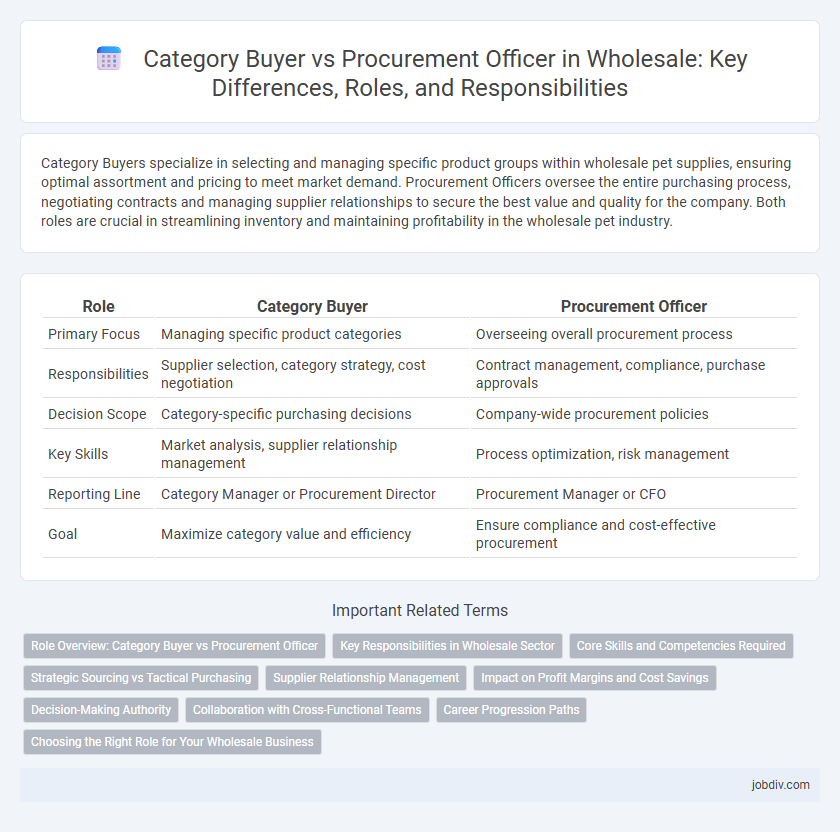Category Buyers specialize in selecting and managing specific product groups within wholesale pet supplies, ensuring optimal assortment and pricing to meet market demand. Procurement Officers oversee the entire purchasing process, negotiating contracts and managing supplier relationships to secure the best value and quality for the company. Both roles are crucial in streamlining inventory and maintaining profitability in the wholesale pet industry.
Table of Comparison
| Role | Category Buyer | Procurement Officer |
|---|---|---|
| Primary Focus | Managing specific product categories | Overseeing overall procurement process |
| Responsibilities | Supplier selection, category strategy, cost negotiation | Contract management, compliance, purchase approvals |
| Decision Scope | Category-specific purchasing decisions | Company-wide procurement policies |
| Key Skills | Market analysis, supplier relationship management | Process optimization, risk management |
| Reporting Line | Category Manager or Procurement Director | Procurement Manager or CFO |
| Goal | Maximize category value and efficiency | Ensure compliance and cost-effective procurement |
Role Overview: Category Buyer vs Procurement Officer
Category Buyers specialize in managing specific product categories, analyzing market trends, and negotiating supplier contracts to optimize inventory and pricing strategies. Procurement Officers oversee the entire purchasing process, ensuring compliance with company policies, managing supplier relationships, and coordinating cross-departmental procurement activities to meet operational demands. Both roles aim to balance cost efficiency and quality, with Category Buyers focusing on category-specific expertise and Procurement Officers on broad procurement governance.
Key Responsibilities in Wholesale Sector
Category Buyers in wholesale focus on selecting and managing product categories, analyzing market trends, and negotiating with suppliers to optimize assortment and pricing. Procurement Officers handle the end-to-end purchasing process, including supplier evaluation, order placement, and ensuring timely delivery and quality compliance. Both roles require strategic supplier relationship management but differ in scope, with Category Buyers emphasizing category strategy and Procurement Officers focusing on operational procurement.
Core Skills and Competencies Required
Category Buyers excel in market analysis, vendor negotiation, and portfolio management, focusing on optimizing product categories to maximize profitability. Procurement Officers demonstrate strong skills in supplier relationship management, contract compliance, and risk mitigation, ensuring seamless acquisition processes. Both roles require analytical thinking, effective communication, and strategic sourcing competencies to drive cost efficiency and operational excellence in wholesale environments.
Strategic Sourcing vs Tactical Purchasing
Category Buyers focus on strategic sourcing by analyzing market trends, supplier capabilities, and total cost of ownership to negotiate long-term contracts that align with business goals. Procurement Officers handle tactical purchasing by processing orders, managing supplier relationships, and ensuring timely delivery to meet immediate operational needs. This distinction enhances efficiency in wholesale by balancing strategic supplier partnerships with day-to-day transactional activities.
Supplier Relationship Management
Category Buyers strategically manage supplier portfolios to optimize product assortments and pricing within specific categories, enhancing competitive advantage. Procurement Officers focus on establishing and maintaining long-term supplier relationships, ensuring contract compliance, quality standards, and risk mitigation across the supply chain. Both roles collaborate closely in supplier relationship management to drive cost efficiency, supplier performance, and seamless integration of procurement processes.
Impact on Profit Margins and Cost Savings
Category Buyers specialize in selecting and managing product lines within specific market segments, leveraging supplier relationships to negotiate better prices and optimize inventory turnover, directly boosting profit margins. Procurement Officers oversee the purchasing process, ensuring compliance and cost control across multiple categories, which helps reduce overhead expenses and achieve significant cost savings. Effective collaboration between both roles enhances strategic sourcing decisions, improving overall financial performance in wholesale operations.
Decision-Making Authority
Category Buyers typically have the authority to make purchasing decisions within specific product categories, managing supplier relationships and contract negotiations to optimize cost and quality. Procurement Officers often oversee broader procurement strategies across multiple categories, ensuring compliance with organizational policies and alignment with overall business objectives. While Category Buyers focus on tactical decisions for category-specific needs, Procurement Officers hold strategic decision-making authority that impacts the company's comprehensive sourcing and supply chain management.
Collaboration with Cross-Functional Teams
Category buyers collaborate closely with marketing, sales, and supply chain teams to align product assortment with market demand and optimize inventory turnover. Procurement officers work alongside finance, legal, and quality assurance departments to ensure compliance, cost efficiency, and risk management in supplier contracts. Both roles rely on effective cross-functional communication to synchronize purchasing strategies with broader business objectives in wholesale operations.
Career Progression Paths
Category Buyers typically manage product assortments and supplier relationships within specific categories, gaining expertise that can lead to senior roles such as Category Manager or Strategic Sourcing Manager. Procurement Officers handle broader purchasing activities across multiple categories and often transition into roles like Procurement Manager or Supply Chain Director. Both career paths emphasize developing negotiation skills, supplier management, and data analytics to advance within wholesale procurement and strategic sourcing functions.
Choosing the Right Role for Your Wholesale Business
A Category Buyer specializes in managing and optimizing product categories, driving sales through focused assortment strategies and supplier relationships to maximize profitability in wholesale markets. A Procurement Officer oversees the broader purchasing process, negotiating contracts and ensuring cost-effective sourcing aligned with overall business objectives. Selecting the right role depends on your wholesale business size and complexity: Category Buyers enhance targeted product management, while Procurement Officers ensure comprehensive procurement efficiency.
Category Buyer vs Procurement Officer Infographic

 jobdiv.com
jobdiv.com